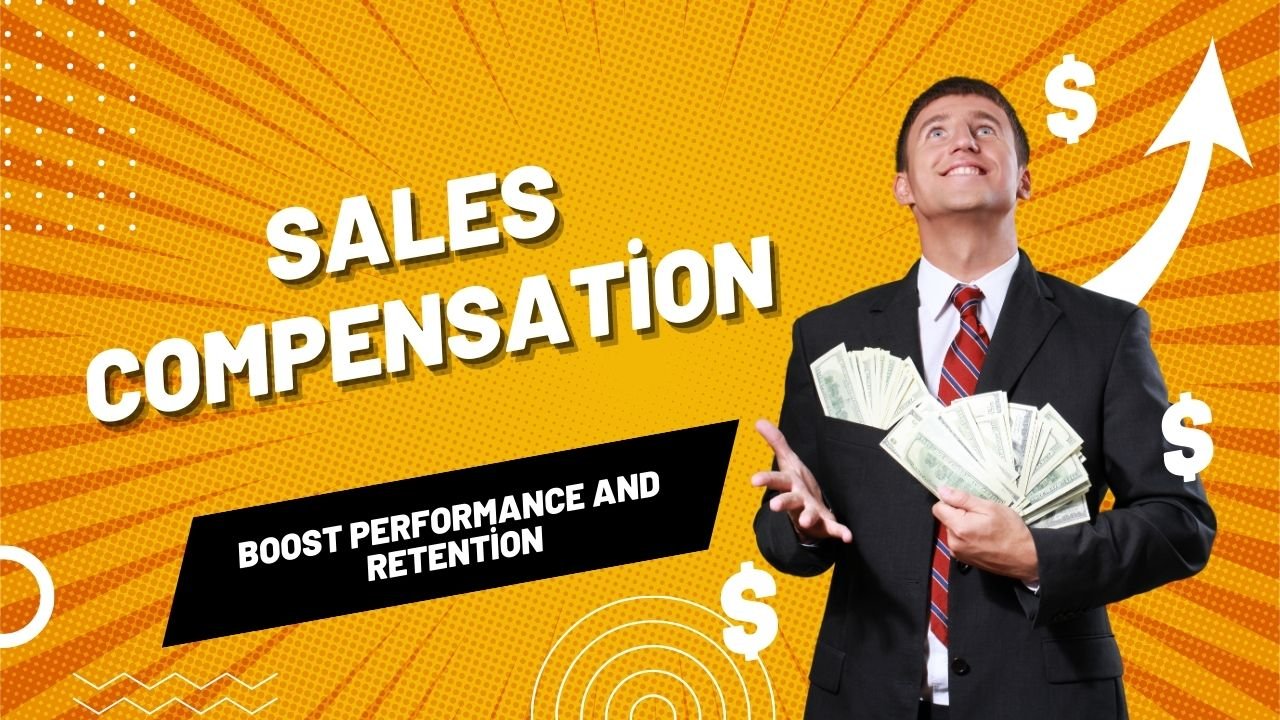
When we think about sales, one of the first things that comes to mind is compensation. It’s not surprising – after all, money plays a huge role in motivating a sales team. But there’s a lot more to sales compensation than just paychecks and commissions. It’s about finding the right balance that keeps people motivated without making them feel like they’re working just for a paycheck.
Let’s be honest: sales can be a tough job. Every day, salespeople face rejection, uncertainty, and pressure to meet quotas. So, how do you keep your team inspired to push through those challenges? It all starts with compensation. A well-thought-out sales compensation plan can be the difference between a team that’s simply going through the motions and one that’s consistently knocking it out of the park.
In this post, we’re going to dig into what makes a good sales compensation plan, why it matters, and how you can build one that works for your business. Ready? Let’s dive in.
What Is Sales Compensation?

Sales compensation is basically the total package you offer your sales team in exchange for their work. This includes base salary, commissions, bonuses, and sometimes even perks like company cars or trips. But here’s the thing – sales compensation isn’t just about throwing money at people to get them to sell more. It’s about creating a structure that drives the right behaviours and makes people feel rewarded for their hard work.
Think about it: a person who feels fairly compensated is much more likely to stay engaged, focused, and motivated. On the flip side, if someone feels like they’re underpaid or that their efforts aren’t recognised, they’re going to look for another job – or worse, they’ll stick around but stop caring.
Why Is Sales Compensation So Important?
Let’s be real – people need money. But beyond just paying bills and buying groceries, the way you compensate your sales team can shape their entire attitude toward their job. A good compensation plan doesn’t just keep the lights on; it motivates your team to sell more, perform better, and stay with your company for the long haul.
Here’s a personal example: I once worked at a company where the sales compensation plan was… well, pretty terrible. We had a base salary, which was fine, but the commission structure was so confusing that no one really knew how much they were going to make each month. As a result, the sales team was constantly stressed out, which led to poor performance and, eventually, high turnover. After a while, management caught on and revamped the compensation plan to be more transparent and fair. Almost immediately, the team’s morale improved, and sales started to climb.
What Are the Core Components of a Sales Compensation Plan?

So, what goes into a good sales compensation plan? Let’s break it down.
Base Salary
The base salary is the fixed amount that your sales team gets paid, no matter how many deals they close. It’s a safety net that offers stability, which is important because sales can be unpredictable. Having a steady paycheck gives people peace of mind – they know that even if they have a slow month, they’ll still be able to pay their rent.
But here’s where it gets tricky. If the base salary is too high, your salespeople might not feel motivated to hustle for those extra commissions. On the other hand, if it’s too low, they might feel like they’re always living in survival mode, which can lead to burnout. So, you need to find that sweet spot where the base salary provides enough security without removing the incentive to work harder.
Commissions
Commissions are where things get exciting. This is the part of the compensation plan that’s directly tied to performance – the more someone sells, the more they earn. For a lot of salespeople, commissions are what make the job worth it. It’s that feeling of knowing that if they put in the effort, they’ll be rewarded.
There are a few different ways you can structure commissions:
- Straight Commission: This is where salespeople earn a percentage of each sale they make. For example, if someone closes a $10,000 deal and they earn a 10% commission, they’ll take home $1,000. This model is great for high-energy salespeople who thrive on competition and don’t mind a bit of risk.
- Tiered Commission: This is when you offer different commission rates based on performance. For example, if a salesperson brings in $50,000 in sales, they earn a 5% commission, but if they bring in $100,000, they bump up to 8%. This encourages people to push past their initial goals and aim for even higher numbers.
- Residual Commission: This is common in industries with recurring revenue, like subscription services. Salespeople earn a commission every time the customer renews their contract. It’s a great way to incentivize long-term customer relationships.
Bonuses
Bonuses are a nice little extra that can really drive motivation. Unlike commissions, which are tied to individual sales, bonuses are usually tied to hitting bigger goals, like a monthly or quarterly sales target. You can also offer bonuses for things like bringing in new customers or upselling to existing ones.
Bonuses are great because they give your team something to work toward. They’re like a carrot dangling in front of your salespeople, urging them to reach for more.
Non-Monetary Perks
Not everything about sales compensation has to be about money. Sometimes, the little perks can be just as motivating. For example, I knew a sales manager who started offering extra paid vacation days as a reward for top performers. It was a simple gesture, but it made a huge difference in morale. Other perks might include flexible work hours, remote work options, or even company-sponsored trips.
The point is that people are motivated by different things. Some might be all about the money, while others care more about work-life balance or recognition. It’s important to understand what makes your team tick and build in perks that resonate with them.
Equity and Stock Options
For startups and growing businesses, equity can be a huge motivator. Offering stock options or shares in the company gives salespeople a real stake in the company’s success. It’s not just about hitting sales numbers – it’s about helping the business grow and sharing in the rewards.
Equity isn’t always top-of-mind for salespeople, especially those who are just starting out. But for those who see the long-term potential, it can be a game-changer.
How to Build the Right Sales Compensation Plan?
Now that we’ve covered the core components, how do you actually put together a sales compensation plan that works? It’s not as simple as plugging numbers into a spreadsheet – you need to think about your team, your business, and your goals.
Understand Your Team’s Motivations
This might seem obvious, but it’s important: not everyone is motivated by the same thing. Some salespeople are all about the money – they want the highest commissions and biggest bonuses they can get. Others might value stability or work-life balance more. The key to creating a great sales compensation plan is understanding what drives your team and then building a plan that taps into those motivations.
For example, if you have a team that’s heavily driven by competition, a commission-heavy plan with tiered bonuses might be the way to go. On the other hand, if your team values stability, you might need to offer a higher base salary with smaller, more predictable bonuses.
Align the Plan with Company Goals
Your sales compensation plan should always tie back to your company’s overall goals. If your goal is to increase new customer acquisition, then your compensation plan should reward people for bringing in new clients. If you’re focused on growing revenue, then commissions should be based on sales volume or profitability.
It’s important to make sure your team understands how their compensation is tied to the company’s success. This helps create a sense of alignment and shared purpose. When people feel like they’re working toward a common goal, they’re more likely to stay engaged and motivated.
Make It Simple and Transparent
One of the biggest mistakes I’ve seen companies make is creating a sales compensation plan that’s overly complicated. If your sales team can’t easily figure out how much they’re going to make or how commissions are calculated, it’s going to lead to frustration.
Keep things simple. Make sure the commission structure is easy to understand and that bonuses are clearly tied to specific, achievable goals. Transparency is key – your team should always know exactly what they need to do to earn their full compensation.
Don’t Be Afraid to Adjust
Sales compensation plans aren’t set in stone. As your business grows and evolves, your compensation plan should, too. Don’t be afraid to make adjustments if something isn’t working. Maybe your commission structure needs tweaking, or perhaps you need to introduce a new bonus to drive a specific behaviour.
It’s okay to experiment. Just make sure you communicate any changes clearly and give your team plenty of time to adjust.
What Are the Common Sales Compensation Models?
There are several common sales compensation models to consider. Each has its own advantages and disadvantages, depending on your business type and goals.
- Straight Salary
In this model, salespeople receive a fixed salary with no additional compensation based on performance. This is common in industries with long sales cycles, where it might take months or even years to close a deal. While it provides security for the salesperson, it can also lead to complacency without the promise of additional rewards.
- Salary Plus Commission
This is one of the most popular models because it provides a balance between stability and motivation. Salespeople receive a base salary, ensuring financial security while also earning commissions based on their performance. The commission structure can vary, but this model generally ensures that salespeople are incentivised to perform well.
- Commission Only
In this high-risk, high-reward model, salespeople earn no base salary and are paid solely on the commissions they generate. It’s often used in highly competitive sales environments, where top performers can earn significant payouts. However, it can also lead to high turnover, as some salespeople may struggle to succeed without the safety net of a base salary.
- Profit-Based Compensation
In this model, compensation is tied to the profitability of each sale rather than the sale itself. This encourages salespeople to focus not just on closing deals but on closing profitable ones. It’s particularly useful in industries with tight margins or where customer lifetime value is critical.
How to Motivate Your Sales Team Beyond Compensation?
While compensation is critical, it’s important to remember that it’s not the only factor that motivates salespeople. Many companies make the mistake of assuming that throwing money at their sales team will automatically drive performance, but that’s not always the case. Here are some additional strategies to keep your team engaged and motivated:
- Create a Positive Work Environment
A positive, collaborative culture can be just as motivating as a fat paycheck. Salespeople are more likely to put in extra effort when they feel supported, valued, and part of a winning team.
- Provide Ongoing Training and Development
Salespeople want to grow and improve their skills. Providing them with opportunities for training, whether it’s in the form of formal courses, mentorship, or simply giving them time to learn on the job, shows that you’re invested in their long-term success.
- Recognise and Reward Effort
Salespeople thrive on recognition. Whether it’s a simple “thank you,” a shout-out at a team meeting, or a more formal award, recognising your team’s efforts can have a huge impact on morale and motivation.
- Offer Clear Paths to Advancement
Top sales performers are often highly ambitious. Giving them clear opportunities for promotion or advancement within your company can be a powerful motivator.
- Set Meaningful Goals
Salespeople tend to perform better when they have clear, meaningful goals to strive for. Allowing them to have some freedom in how they achieve those goals can further enhance motivation, as it fosters a sense of ownership and responsibility over their work.
- Encourage Healthy Competition
Friendly competition within the sales team can act as a powerful motivator. Running internal sales contests, offering incentives for top performers, or implementing a leaderboard can spark a healthy drive to succeed without relying solely on monetary rewards.
Wrapping It Up
At the end of the day, sales compensation isn’t just about numbers. It’s about people. Salespeople are human beings with different needs, motivations, and goals. A great compensation plan recognises this and offers a balanced package that makes people feel valued and inspired to give their best effort.
As you think about your own sales compensation plan, keep the human element in mind. What drives your team? What makes them feel appreciated? What are they really working towards? If you can answer those questions, you’ll be well on your way to crafting a plan that not only drives results but also builds a stronger, more motivated team.








No Comments